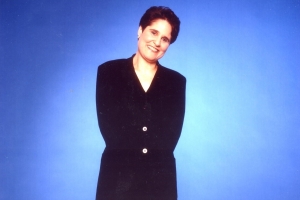What Debbie meant
Permanent link All Posts

Every genre has its "without whom," as in "...without whom this music would not exist, at least not as we know it." Jazz has Louis Armstrong. Folk has Pete Seeger. Blues has Robert Johnson. And modern Jewish music has Debbie Friedman.
As a summer camper, I was regularly handed songsheets during campfires and sing-alongs. Mostly I knew all the words by that point. But one time, I actually looked at the sheets, and had a revelation— someone wrote these songs! At age nine, I had assumed that all of the great camp songs came from some bygone era, around Camelot or Chaucer… that they were all “Traditional” songs written by some “Anonymous” ancient bard. I had thought these songs were as old as the rocks and trees.
Not necessarily. While that was true of some of the songs, others were written by Bob Dylan, James Taylor, Carole King, John Denver, Joni Mitchell, Paul Simon— names I knew from the radio and my parents’ LP collection.
And then the songs on the sheets that were partly in English and partly in Hebrew were written by a woman named Debbie Friedman. She was the bridge. She was the link between the Torah- and Siddur-based songs and the English-language folksongs, both antique and modern.
Although Debbie used an acoustic guitar, the effects were electrifying. For a nine-year-old boy sitting in the dirt in a summer camp outside Sugar Grove, Pennsylvania, this was like being told that he had superpowers.
The revelation was this: If someone wrote these songs, then anyone could! Even… me! And I have; aside from writing about Jewish music these ten years, I am also a member of ASCAP and a published songwriter.
But the magic of Debbie’s soul wasn’t just that she made me want to be a songwriter. It’s that she also made someone else want to be a cantor. And , someone else a camp director. And someone else a rabbi. Or bar/bat mitzvah tutor… or a Jewish philanthropist… or even a Jewish musician.
Debbie’s music, and her shining spirit, made people want to participate in the Jewish community and Jewish life. She made people want to be Jewish leaders and teachers, but mostly she made people want to be Jewish.
While Debbie left us a trove of indelible music, perhaps her greatest legacy lies in the millions of Jews worldwide who do what they do because Debbie’s music encouraged them to. You can’t talk to a songwriter who wasn’t influenced by John Lennon. And you can’t talk to a Jewish community worker who wasn’t influenced by Debbie Friedman.
This is where I am supposed to say that, while Debbie is gone, her music lives on. Yes, but her fire— her smile, her presence, her living voice— being gone from the world makes our planet much, much darker and colder. With Debbie gone, all we have are her recordings and memories, and these are going to have to do.
What comfort there is comes from knowing that her light has kindled so many others’. Because of Debbie Friedman, we have: Craig Taubman, Julie Silver, Rabbi Joe Black, Sam Glaser, Rick Recht, Beth Schafer, Josh Nelson, Noah Budin, Peri Smilow, Kol Sasson, Visions, Steve Dropkin, Robbie Sherwin, Cantor Wally, Dan Nichols, Mama Doni, Linda Hirschhorn, Mishpacha, Scott Leader, Fran Avni, Judy Frankel, Doug Cotler, Shira Kline, Judy and David, Cindy Paley, and Jeff Klepper. So we can go to their concerts, to hear Debbie in them.
Further, her liturgical melodies have had more impact on what is sung in synagogues worldwide than any other woman in Judaism’s 4,000-year history. Millions of Jews sing Debbie’s melodies every week having no more knowledge of her authorship than… well, than my nine-year-old self knew that “I Got a Name” was written by Jim Croce and not an anonymous contemporary of Shakespeare.
What did Debbie mean? Debbie helped generations rediscover the joy of being Jewish. She reminded us of its meaning and its meanginfulness. She celebrated the inclusion of women and children in Jewish history and tradition. She won back disenchanted and alienated Jews. She never let her withering, devastating illness stop her from smiling and singing.
Debbie meant that being Jewish was fun, spiritual and desirable. She made it hopeful, meaningful and powerful. Debbie’s music was uplifting, inspiring, and— perhaps most importantly— encouraging. Her message was that being Jewish was something that you could do, that you were excited about. Her energy was energizing, her power empowering.
Debbie’s legacy is that she meant something to all of us, and meant something different to each of us. “She belonged to the community,” we feel, “but she belonged to me, too.”
And so we say— far too soon— a final “Shalom” to Debbie Friedman. Without whom.
Paul Wieder interviews Debbie Friedman
In memory of Debbie Friedman, we offer her interview with Paul Wieder in 2009. May her legacy be— as her life was— a blessing for us all.
Click here to download the podcast.
Debbie Friedman’s name is synonymous with American Jewish music. She is one of the foremost artists in the Jewish-music world, having blazed a new genre of Jewish music, bringing American folk and contemporary sounds to traditional texts, a style which now boasts hundreds of performers. She pioneered the movement of Jewish healing services. And, as a liturgical composer, Friedman is more responsible for what is sung in Jewish prayer services than any other woman in history. Her new CD, As You Go On Your Way: Shacharit— The Morning Prayers, continues that lifelong effort.



.jpg)



